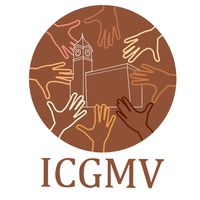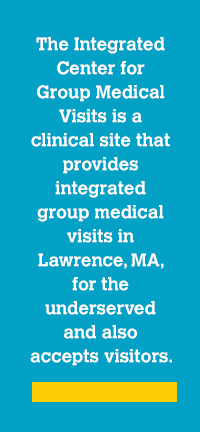
Paula Gardiner, MD, MPH
AACIPM recently had a conversation with Paula Gardiner, MD, MPH, and Jeffrey Geller, MD. We spoke to them about the new Integrated Center for Group Medical Visits, group medical visits for persons living with chronic pain, how group visits can address inequities in underserved communities, and how those services are billed and reimbursed.
Dr. Gardiner is Director of Primary Care Implementation Research at the Center for Mindfulness and Compassion at Cambridge Health Alliance. She is also an Associate Professor at University of Massachusetts Medical School where she directs the Center for Integrated Primary Care’s program on Group Medical Visits.
Jeffrey Geller, MD
What is a group medical visit for patients with chronic pain?
Group medical visits are used for an increasing number of chronic illnesses, including chronic pain symptom management and health issues. Current studies reveal that group visits can improve patient health status, quality of life, satisfaction, trust in their physician, and coordination of care. Groups range from 6-20 patients with one to two facilitators and meet at regular intervals – anywhere from weekly to every month from 1-3 hours. During the group visit, clinicians provide medical care such as an assessment and management. This is done within the group setting or in an adjacent private examining space.

Recent research demonstrates that lifestyle factors such as the foods we eat, exercise, mind-body therapies, and sleep play significant roles in our experience of pain. For example, Mindfulness Based Stress Reduction (MBSR) is a promising Mind-Body group intervention. It consists of 8 weekly classes taught by a trained instructor and one silent retreat day. The major techniques used are sitting and walking meditation, body scans, and mindful yoga. A recent systematic review identified 21 randomized controlled trials of MBSR; eleven of these studies showed improvement in mental health measures compared to wait-list or standard care controls, as well as improved pain scores and mental health status for patients with chronic pain. Patients with two or more co-morbid conditions had the greatest improvement in pain. Dr. Gardiner’s research has focused on how to bring mindfulness into conventional medical settings using group medical visits.
How do group visits address inequities and people who are underserved?
Group visits provide more time and resources to address issues such as housing, affordable food and stress reduction. Facilitators (behavioral health, staff, clinicians) can also be members of the community where the patient lives and have information about the resources in the community.
Evidence-based integrative medicine considers the patient’s mind, body and spirit as factors influencing health and uses a combination of conventional and complementary modalities. Rigorous studies using techniques, such as mindfulness and acupuncture, have demonstrated significant health improvements in chronic pain patients. Offering these treatments in a group setting in a local neighborhood can make them accessible and affordable.
 Why did the Integrated Center for Group Medical Visits (ICGMV) come to be?
Why did the Integrated Center for Group Medical Visits (ICGMV) come to be?
We wanted to create a place that provided high quality education, implementation tools, and research on group medical visits as an efficient model for integrated primary care. We also wanted the Center to be a leader in pushing the conversation on health equity, increasing access to affordable non-pharmacologic treatments, and decreasing the health effects of loneliness. The center is in the community of Lawrence, Massachusetts, which has been deeply affected by the COVID-19 pandemic and gas explosions. More information can be found on the website Group Medical Visits – Integrated Center for Group Medical Visits (icgmv.org).
 What does ICGMV offer?
What does ICGMV offer?
The Integrated Center for Group Medical Visits is a clinical site that provides integrated group medical visits in Lawrence, MA, for the underserved and also accepts visitors. ICGMV jointly with the Center for Integrated Primary Care offers online modules and in person training aimed at building a successful group medical visit program for all types of providers, administrators, and health settings (in addition to a helpful index of group medical visit guides). Having different flavors of trainings allows us to offer them at low cost. The Center is a living laboratory where group visits are happening everyday via telemedicine or in-person, including acupuncture, massage, and exercise group visits. This year we are offering the Inaugural Group Medical Visit Conference, “Together We Heal!” We have an amazing roster of presentations and discussions on various topics about GMVs lined up. There will be three overarching program tracks: Implementation, Health Support, and Research. Each track will consist of breakout sessions, town halls, and poster presentations focusing on a range of topics. There is sure to be something for everyone.
How do group visits get billed?
Currently there are no standardized ICD codes or no nationally accepted standards or explicit guidelines for coding and billing for medical group visits. Clinicians follow the Center for Medicaid and Medicare Services and standard rules in billing using Evaluation and Management (E/M) coding. The AAFP website notes that Medicare has issued a statement regarding group visits:
“…under existing CPT codes and Medicare rules, a physician could furnish a medically necessary face-to-face E/M visit (CPT code 99213 or similar code depending on level of complexity) to a patient that is observed by other patients. From a payment perspective, there is no prohibition on group members observing while a physician provides a service to another beneficiary.” The letter went on to state that any activities of the group (including group counseling activities) should not impact the level of code reported for the individual patient.”
Group visits can be billed using medical E&M code 99213 or 99214, based on appropriate level of medical complexity, if the visit: (a) is provided by a prescribing provider (MD, DO, physician assistant, or nurse practitioner), and (b) contains an individual medical evaluation and management component. Under the CMS guidelines above, there is no limit on the number of patients that can be included; however, it is important to ensure that you provide complete services to each patient during the time period. If you do not provide care you cannot bill for the care of that patient. Based on your staffing, you will have to figure out how many patients you can bill.
More detailed information about billing for group visits can be found here.
What do you think is most important for AACIPM stakeholders to understand about group visits?
Group Visits offer a menu of care options, such as:
- Individual medical attention
- Patient education
- Time for self-management skills
- Time to connect and socialize
The purpose of medical group visits is to reduce symptoms in patients with chronic conditions such as chronic pain, increase access to medical care, and improve self-management skills. For clinicians, groups allow for increased time and opportunity to provide care and connect with patients. Additionally, safe and effective integrative techniques and activities like mind-body practices, movement, cooking demonstrations, acupressure, and meditation can be used to guide patients.
Bio
 Paula Gardiner, MD, MPH, works at the Center for Mindfulness and Compassion at CHA as the director of Primary Care Implementation Research. She is an Associate Professor of Family Medicine and Community Health at University Massachusetts School. She directs the group medical visit program in the Center for Integrated Primary Care. In addition to completing her MPH from the Harvard School of Public Health, she also completed a three-year Clinical Research Fellowship in Complementary Medicine Research and Faculty Development at Harvard Medical School. Dr. Gardiner, with funding from NIH and a PCORI grant, focuses her research on mindfulness, technology, and health disparities and increasing access in low income patients. Current research is focused on the adaptive role of an Medical Group Visits combining mindfulness-based stress reduction (MBSR) and a medical group visit to support health behavior change and reducing pain and stress. Dr. Gardiner is leading the implementation of this medical group visit model nationally and provides training on medical group visits around the United States. She has published over 90 peer-reviewed papers on chronic pain, health disparities, technology, dietary supplements, stress, and integrative medicine in underserved patients. She also has an interest in clinician stress and resiliency. As a researcher in mindfulness, she became a certified meditation teacher completing a 2 year training with Tara Brach and Jack Kornfield, a Mindful Self Compassion teacher completing training with Chris Germer, and has led MBSR classes. She has is also a certified facilitator for Ron Epstein MD and Mick Krasner MD’s Mindfulness Practice program.
Paula Gardiner, MD, MPH, works at the Center for Mindfulness and Compassion at CHA as the director of Primary Care Implementation Research. She is an Associate Professor of Family Medicine and Community Health at University Massachusetts School. She directs the group medical visit program in the Center for Integrated Primary Care. In addition to completing her MPH from the Harvard School of Public Health, she also completed a three-year Clinical Research Fellowship in Complementary Medicine Research and Faculty Development at Harvard Medical School. Dr. Gardiner, with funding from NIH and a PCORI grant, focuses her research on mindfulness, technology, and health disparities and increasing access in low income patients. Current research is focused on the adaptive role of an Medical Group Visits combining mindfulness-based stress reduction (MBSR) and a medical group visit to support health behavior change and reducing pain and stress. Dr. Gardiner is leading the implementation of this medical group visit model nationally and provides training on medical group visits around the United States. She has published over 90 peer-reviewed papers on chronic pain, health disparities, technology, dietary supplements, stress, and integrative medicine in underserved patients. She also has an interest in clinician stress and resiliency. As a researcher in mindfulness, she became a certified meditation teacher completing a 2 year training with Tara Brach and Jack Kornfield, a Mindful Self Compassion teacher completing training with Chris Germer, and has led MBSR classes. She has is also a certified facilitator for Ron Epstein MD and Mick Krasner MD’s Mindfulness Practice program.
Bio
 Jeffrey Geller MD, the 2020 Massachusetts Family Physician of the year, is known for his innovations in primary health care. Since graduating Tufts Medical School in 1996, he developed the modern group medical visit (GMV) models and protocols with the primary goal of treating loneliness. His work with open models which prioritize human connection are a major influence in the field. By pairing integrative treatments with GMV such as Tai Chi, massage, exercise, acupuncture, yoga, and hypnosis he had found an effective method of providing non-pharmacologic treatment for chronic pain, obesity, chronic illness, and addiction. He has won numerous awards from the U.S. Surgeon General, Congress, AAFP, IM4US, and FMEC for creating the largest U.S. group medical visit program which helped patients overcome barriers to health. He helped found Integrative Medicine for the Underserved (IM4US) and is president of the non-profit Integrated Center for Group Medical Visits (ICGMV). ICGMV has the goal of innovating, training, and supporting, GMVs as well as evaluating major GMV concepts such as the Group Inclusion Effect (GIE). Dr. Geller believes that ICGMV, in collaboration with Kronos Health, will revolutionize primary healthcare – giving patients and providers the time and support they need to create health.
Jeffrey Geller MD, the 2020 Massachusetts Family Physician of the year, is known for his innovations in primary health care. Since graduating Tufts Medical School in 1996, he developed the modern group medical visit (GMV) models and protocols with the primary goal of treating loneliness. His work with open models which prioritize human connection are a major influence in the field. By pairing integrative treatments with GMV such as Tai Chi, massage, exercise, acupuncture, yoga, and hypnosis he had found an effective method of providing non-pharmacologic treatment for chronic pain, obesity, chronic illness, and addiction. He has won numerous awards from the U.S. Surgeon General, Congress, AAFP, IM4US, and FMEC for creating the largest U.S. group medical visit program which helped patients overcome barriers to health. He helped found Integrative Medicine for the Underserved (IM4US) and is president of the non-profit Integrated Center for Group Medical Visits (ICGMV). ICGMV has the goal of innovating, training, and supporting, GMVs as well as evaluating major GMV concepts such as the Group Inclusion Effect (GIE). Dr. Geller believes that ICGMV, in collaboration with Kronos Health, will revolutionize primary healthcare – giving patients and providers the time and support they need to create health.

Trackbacks/Pingbacks